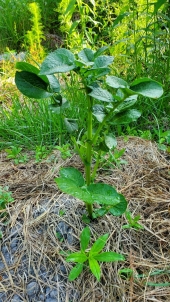Thanks Roy, great advice.
I don't think I'll go to heroic effort to save these favas, as I'm not completely in love with it as a food, yet. Thankfully the bugs haven't found my medieval variety of favas, so fingers crossed I'll get a nice harvest off them. They are the ones I'm most keen to try.
The thing I've learned about March Flies is that they like organic matter like leaf litter, twigs, manure when seeking out somewhere to lay their eggs.
Where the most clusters are located in my garden (prior to them migrating to the favas) was where I had used chipper mulch on the path ways, and even more so, where I put a mulch of straw bedding from the llamas around the plants.
Yet again, mulch fails me. As much as I enjoy reading about everyone's successes with mulch, I fear that it is the one constant for my garden failures. We just don't have the right climate for mulch. Wrong bugs for a start. This is especially true in winter when one would expect mulch to save us from any sudden ground frosts. Mulch seems to prevent the tiny rainfall we get during the growing season from entering the soil, the dew that we get each morning will settle into uncovered soil, but under the mulch is always dry. Maybe it's like
Carol Deppe says in her book The Resilient Gardener, mulch just doesn't work in this part of the world.
The only place mulch hasn't caused me grief is in the permaculture herb garden.
I removed the mulch from the remaining garden, and fingers crossed it will make my garden less attractive to the next generation of bugs.
While I was doing this, I sat my favourite old hen in front of the favas. She went right to work scratching in the dirt and gobbling up the grubs. They are far more delicious than even earthworms. I think, two or four chickens for a supervised hour or so a day should be enough to bring the bug population down to a dull roar instead of a raging tide. Not all chickens like the grubs, so I'll have to experiment and see which ones are especially focused on grub munching.
Muscovy ducks don't like the grubs at all.
The only thing the grubs aren't bothering yet is the garlic and the well established kale (giant jersey). Maybe next winter, I should only grow garlic and kale?
The chard has been hit hard by everything this winter, frost, heat, wet, dry, a thousand and twelve leafhoppers, and now the March Fly grubs. I don't think this variety is worth saving for seed, at least not from this seed source. Going to be on the look out for new chard variety next fall... or perhaps work on my dream of a tender salad green mangelwurzel. Either way, these March Flies are the final nail in the coffin for this line of chard in my garden.
There is some suggestion that March Flies are pollinators, especially for fruit trees. I don't know if that's everywhere in the world, or just some spots. But interesting. Now I know what they look like, I will keep an eye out for them.
I'll let you guys know if there are any more developments. Would still love to hear from anyone who's had similar expierences. What did you do?



























 1
1



































































